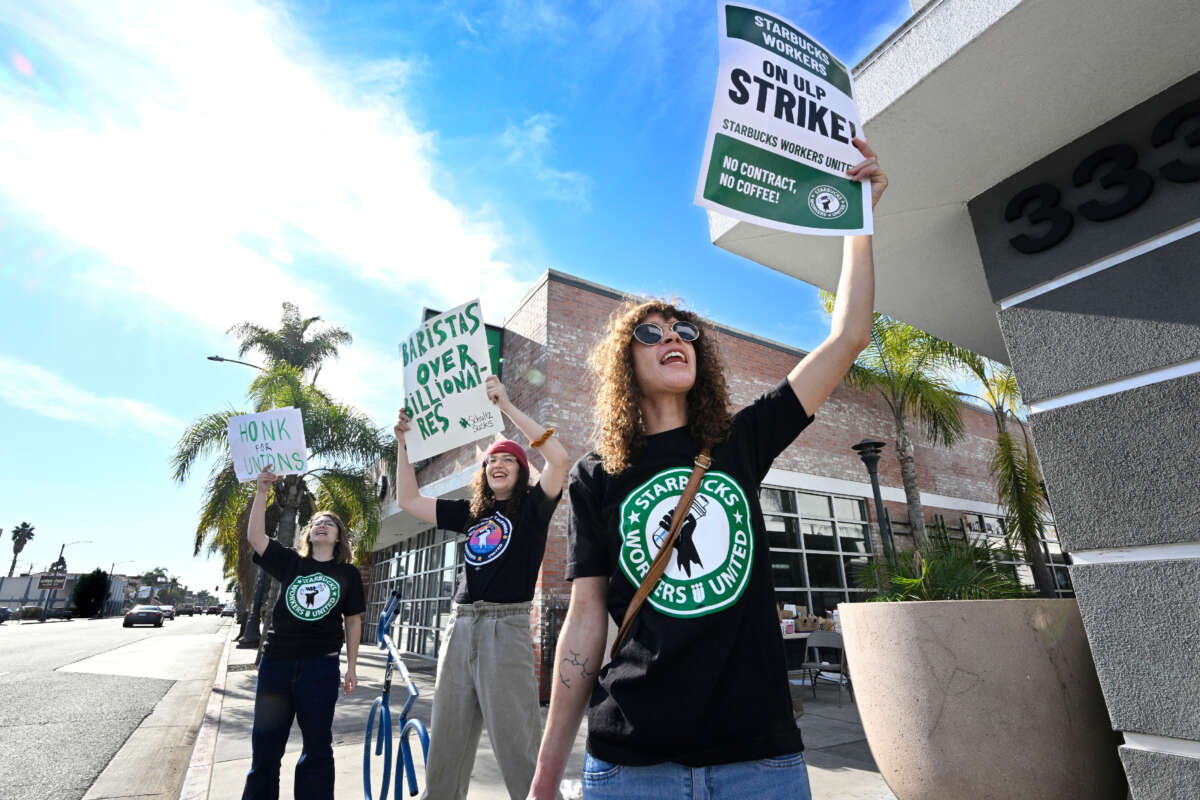Truthout is a vital news source and a living history of political struggle. If you think our work is valuable, support us with a donation of any size.
In a new filing issued by federal labor prosecutors this week, the labor board is alleging that Starbucks’s refusal to bargain with unionized stores in the Pacific Northwest constitutes illegal anti-union activity in the first of what could be many similar complaints to come.
Labor officials wrote in their complaint, filed on behalf of the National Labor Relations Board (NLRB) general counsel, that the company “has been failing and refusing to bargain collectively” with stores across Oregon and Washington that have unionized as part of Starbucks Workers United’s historic campaign over the past year. The complaint was first reported on by Bloomberg.
The complaint says that the company should be forced to bargain with the union and that Starbucks CEO Howard Schultz should be forced to attend a reading of workers’ rights, with labor officials, union representatives and workers present.
“This complaint proves what workers have been saying all along — Starbucks is dragging their feet [at] the negotiating table and refusing to bargain with us in good faith,” Michelle Eisen, Starbucks Workers United leader, said in a statement.
This is the first time that the labor board has issued a complaint against the company for refusing to bargain with multiple stores. Last month, the labor board ruled that the company illegally failed to negotiate with its hometown roastery in Seattle, and that it must begin negotiations with the union.
The labor board may issue similar complaints soon, as the union has filed multiple complaints over the company’s refusal to bargain. Workers have expressed frustration about the lack of bargaining after waiting months for a bargaining date, as the company has stonewalled negotiations in many locations and company representatives have walked out of sessions after just minutes of being in the room.
Although it’s illegal for companies to refuse to bargain in good faith with union representatives, it’s typical for companies to drag out the process; according to an analysis last year by Bloomberg Law, it takes over 400 days on average for both parties to sign a collective bargaining agreement after the formation of a union.
It’s unclear as of yet if Starbucks will stretch this timeline longer, though the negotiating process alone often takes months. Meanwhile, some stores’ unions — none of which have a first contract — are now over a year old.
“By year’s end we will have appeared in-person for more than 75 single-store bargaining sessions,” Starbucks representative Rachel Wall said in response to the NLRB filing. But workers have said that several stores have had multiple bargaining sessions in which company representatives left before hearing a single demand.
Violating the law appears to be a tactic frequently employed by Starbucks to discourage workers from unionizing. According to the union, the NLRB has issued 50 complaints against the company, encompassing over 1,000 violations of federal labor laws.
“This is why we say Starbucks is the worst violator of federal labor law in modern US history,” the union wrote in a tweet last week. “[Schultz], [board Chair Mellody Hobson] and the Starbucks board have no respect for their workers and clearly no respect for the law.”
Workers have launched multiple national strikes in protest of the company’s refusal to bargain with workers and its continued anti-union tactics.
A terrifying moment. We appeal for your support.
In the last weeks, we have witnessed an authoritarian assault on communities in Minnesota and across the nation.
The need for truthful, grassroots reporting is urgent at this cataclysmic historical moment. Yet, Trump-aligned billionaires and other allies have taken over many legacy media outlets — the culmination of a decades-long campaign to place control of the narrative into the hands of the political right.
We refuse to let Trump’s blatant propaganda machine go unchecked. Untethered to corporate ownership or advertisers, Truthout remains fearless in our reporting and our determination to use journalism as a tool for justice.
But we need your help just to fund our basic expenses. Over 80 percent of Truthout’s funding comes from small individual donations from our community of readers, and over a third of our total budget is supported by recurring monthly donors.
Truthout’s fundraiser ends tonight! We have a goal to add 122 new monthly donors before midnight. Whether you can make a small monthly donation or a larger one-time gift, Truthout only works with your support.
